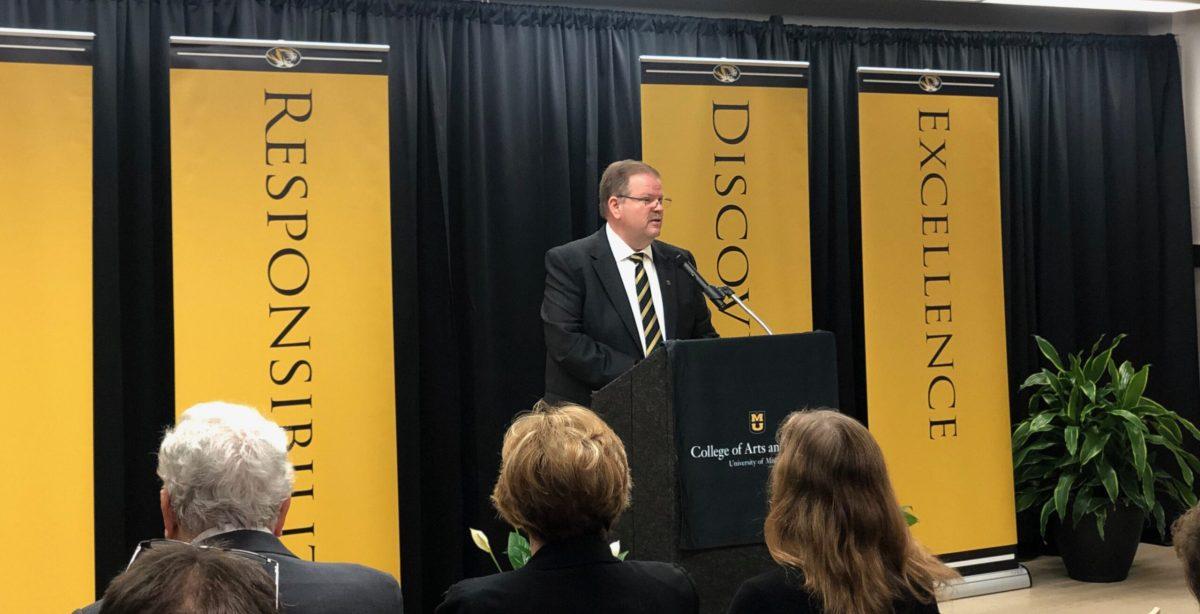
Two years after his 1967 graduation from MU with a Master of Science in physics and astronomy, Ronald Boain moved to Houston, Texas to perform contingency analysis for NASA’s Apollo 11 mission.
That same year, Boain donated to MU for the first time, with a gift of $5. On Friday morning, Boain and his wife Catherine Boain announced their donation of a larger gift — $1.28 million, marking their 50th year of giving to the university.
The gift will support the MU Department of Physics and Astronomy. It consists of two parts: the Ronald J. Boain and Catherine J. Rangel Boain Endowment fund of $1.25 million and the Boain Ph.D. Dissertation Award and Travel Fund, which consists of the other $30,000 and officially began last year.
The couple’s donation was officially announced at a short ceremony Friday morning in the Physics Building. The ceremony included speeches from various MU officials and a reception.
“This gift means that a physics major will be able to devote a summer to an internship without worrying about having to earn a paycheck, an astronomy student will be able to present original, hands-on research at a professional conference [and] a graduate student will be recognized for exceptional dissertation research,” Patricia Okker, dean of the College of Arts and Sciences said in her speech. “There will be an impact that we do not yet know, but even 50 years from now, people will get to celebrate that.”
After six years in Houston, Boain began working at NASA’s Jet Propulsion Laboratory in Pasadena, California. He held a variety of positions and traveled to places such as Washington, D.C., France and Japan.
In 2007, Boain received the NASA Exceptional Achievement Medal for his work on CloudSat, a mission that helps scientists study the structure of clouds and aerosols and is still running in Earth’s orbit today.
Now that Boain is retired, he had the opportunity to use the money in his estate and felt that MU was the best place to donate it.
“[This] entity, this institution enabled my career and my life,” Boain said in his speech. “The time has come to repay the university for all that it has given to me — a foundational education that has enabled me to succeed.”
He wants to help the College of Arts and Science continue to thrive and grow in the years to come.
“Mizzou has acquired a Nobel Prize in chemistry, but we should not let that be the end,” Boain said. “We should be using our vision for the future.”
Boain’s love for space originated far before he began studying at MU in 1961. As a child, he joined Boy Scouts and was first exposed to astronomy at an overnight summer camp.
“I quickly became fascinated with the stars and planets,” Boain said in his speech. “Our little house was far enough removed from the bright city lights that it provided a near-perfect location for observing the night sky with a small telescope.”
By the time he got to high school, Boain was a self-proclaimed “astronomy nerd.”
“As it turns out, being an astronomy nerd was okay at that time, because the launching of Sputnik in 1957 gave me cover,” Boain said in his speech. “Everyone was always looking at the stars and trying to catch a glimpse of Earth’s first artificial satellite.”
Chancellor Alexander Cartwright believes that Boain’s gift will help students who are as passionate as Boain continue to succeed.
“[Boain is] focused on the right things,” Cartwright said. “He’s focused on students, and he’s focused on excellence, so I think [we need to do] anything we can do to help students actually have these opportunities to really take their scientific studies to the next level.”
_Edited by Laura Evans | [email protected]_